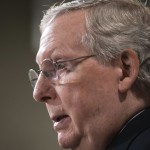From Roll Call. By Todd Ruger. Jan. 19, 2016.
Dozens of former federal prosecutors and government officials sent a letter to the Senate leadership Tuesday urging a vote on a bipartisan bill to overhaul the nation’s criminal sentencing laws.
The letter to Majority Leader Mitch McConnell, R-Ky., and Minority Leader Harry Reid, D-Nev., seeks to counter concerns about the bill (S 2123) and instead focus on improvements it makes to the corrections system.
“Otherwise, good policy reforms could easily fall victim to politics and fear,” the letter states.
Signers include Michael Mukasey, an attorney general under President George W. Bush, former FBI directors Louis J. Freeh and William S. Sessions, several former U.S. attorneys and several federal appeals court and district court judges.
The letter arrives at the Senate a week after President Barack Obama used his State of the Union address to note bipartisan support for criminal justice legislation.
The compromise bill, negotiated for weeks behind closed doors, has the support of many of the most powerful senators and advanced out of the Senate Judiciary Committee on a 15-5 vote in October.
The bill would give judges more discretion in sentencing, reduce some of what advocates of change consider the most unfair mandatory minimum sentences and allow low-risk prisoners to qualify for earlier release.
McConnell, who makes the decision about floor votes, has not said if the Senate will vote on the bill. Majority Whip John Cornyn, R-Texas, a co-sponsor, has said that would happen in 2016. Judiciary Committee Chairman Sen. Charles E. Grassley, R-Iowa, is also pressing for a vote soon.
The momentum for a sentencing overhaul bill faces a challenge because of the tight schedule in an election year and the possibility that the Republicans won’t retain their Senate majority. There is also opposition, including from a separate group of former federal prosecutors who sent a letter to leadership in December with concerns about the bill.
The letter sent by Mukasey and others Tuesday seeks to counter those concerns. It says the bill makes “modest, reasonable changes” that would amend “just a few sentencing policies that produced unintended consequences and created imbalance in the scales of justice.”…




